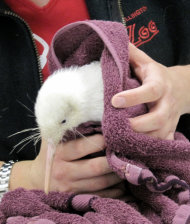Manukura the white kiwi is among the rarest of birds. And she appears to have regained her mojo after a heart scare during surgery Friday to remove a stone from her gizzard.
That means watch out — even if the 6-month-old flightless bird weighs just two pounds (1 kilogram).
"You try to grab her and she kind of karate chops you," said veterinarian Lisa Argilla, at the Wellington Zoo, where Manukura is recuperating. "She growls and she grumbles and she's getting really stroppy. So that's great, that's normal kiwi behavior, and we love it when our patients do that."
Kiwi are noctural birds native to New Zealand and have been decimated by introduced predators. Most kiwi are brown to help hide in the forest undergrowth. White kiwi, which lack a color gene, have been sighted in the wild, but Manukura is the first born in captivity.
When she was born May 1, native Maori leaders took it as an omen. Her Maori name means "of chiefly status" and some believe her arrival heralds a new beginning.
"The elders here believe it to be something very, very special," said Jason Kerehi, the chief executive of the Rangitane o Wairarapa tribe and a board member at the Pukaha Mount Bruce National Wildlife Centre where the chick was born. "She is an inspiration to all people."
Although a little underweight, Manukura developed normally enough until about two weeks ago, when rangers at the wildlife center noticed she wasn't eating. She was taken to the zoo where an X-ray revealed she'd swallowed two stones, the larger of which was about the size of a gumball.
It's not unusual for birds to eat stones to help with digestion, but Manukura only managed to pass one of the stones naturally.
So she was taken to the Wellington Hospital, where a urologist was able to zap the stone with a laser to reduce its size and then remove it through her beak, said Argilla — but not before the bird's heart rate dropped precipitously at one point, giving staff a scare.
Manukura will likely be returned to the Mount Bruce wildlife center next week. Although the center is designed to rear kiwi chicks and then return them to the wild, Manukura may stay.
"She's smaller than average, and there's a theory that she would be more susceptible to predation because of her color," said Chris Lester, a manager for the Department of Conservation which has been looking after the bird.
In the end, say Lester and Kerehi, the decision will rest with Manukura. If she stays calm about her life in captivity, they'll keep her.
But, they say, if she starts fretting for her freedom, kicking up a fuss, then it will be time to let her go.
That means watch out — even if the 6-month-old flightless bird weighs just two pounds (1 kilogram).
"You try to grab her and she kind of karate chops you," said veterinarian Lisa Argilla, at the Wellington Zoo, where Manukura is recuperating. "She growls and she grumbles and she's getting really stroppy. So that's great, that's normal kiwi behavior, and we love it when our patients do that."
Kiwi are noctural birds native to New Zealand and have been decimated by introduced predators. Most kiwi are brown to help hide in the forest undergrowth. White kiwi, which lack a color gene, have been sighted in the wild, but Manukura is the first born in captivity.
When she was born May 1, native Maori leaders took it as an omen. Her Maori name means "of chiefly status" and some believe her arrival heralds a new beginning.
"The elders here believe it to be something very, very special," said Jason Kerehi, the chief executive of the Rangitane o Wairarapa tribe and a board member at the Pukaha Mount Bruce National Wildlife Centre where the chick was born. "She is an inspiration to all people."
Although a little underweight, Manukura developed normally enough until about two weeks ago, when rangers at the wildlife center noticed she wasn't eating. She was taken to the zoo where an X-ray revealed she'd swallowed two stones, the larger of which was about the size of a gumball.
It's not unusual for birds to eat stones to help with digestion, but Manukura only managed to pass one of the stones naturally.
So she was taken to the Wellington Hospital, where a urologist was able to zap the stone with a laser to reduce its size and then remove it through her beak, said Argilla — but not before the bird's heart rate dropped precipitously at one point, giving staff a scare.
Manukura will likely be returned to the Mount Bruce wildlife center next week. Although the center is designed to rear kiwi chicks and then return them to the wild, Manukura may stay.
"She's smaller than average, and there's a theory that she would be more susceptible to predation because of her color," said Chris Lester, a manager for the Department of Conservation which has been looking after the bird.
In the end, say Lester and Kerehi, the decision will rest with Manukura. If she stays calm about her life in captivity, they'll keep her.
But, they say, if she starts fretting for her freedom, kicking up a fuss, then it will be time to let her go.

No comments:
Post a Comment